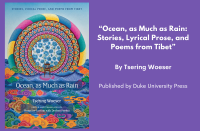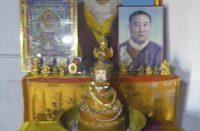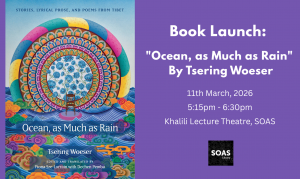
High Peaks Pure Earth has translated a blogpost by Woeser, originally written for the Mandarin service of Radio Free Asia and published on her blog on April 22, 2017.
As is now well documented, Woeser enjoyed a close friendship with scholar Elliot Sperling who unexpectedly passed away early this year. Following memorials in New York and Dharamsala, a service was held on April 8 at Indiana University where Elliot Sperling was Professor at the Department of Central Eurasian Studies. Many colleagues, friends and students of Elliot Sperling’s attended the service, including his daughter Coline, and Woeser contributed via Skype.
To learn more about Elliot Sperling’s life and work, visit the website set up in his memory: http://elliotsperling.org/
“A Commemoration That Is So Much More – Remembering Elliot Sperling”
By Woeser
An ongoing and continuous commemoration. It has now been almost three months since Elliot Sperling suddenly passed away on January 29. I still remember clearly how I felt when this tragic news came to my ears: a feeling of disbelief, of incredible grief and regrets… almost three months. Even though the pain that I felt at the time has been gradually fading away, a feeling of emptiness persists. It is precisely this enormous feeling of emptiness, of missing something important, it is this emotional void that makes us so sad.
 On April 8, Indiana University held a memorial service, a tribute to Elliot Sperling, Professor at the Department of Central Eurasian Studies and long-term director of the Centre for Tibetan Studies. Many distinguished international Tibetologists were present, Elliot Sperling’s colleagues and students, as well as his daughter and his close friends. I was also invited to say a few words at the beginning via Skype. This is what I said:
On April 8, Indiana University held a memorial service, a tribute to Elliot Sperling, Professor at the Department of Central Eurasian Studies and long-term director of the Centre for Tibetan Studies. Many distinguished international Tibetologists were present, Elliot Sperling’s colleagues and students, as well as his daughter and his close friends. I was also invited to say a few words at the beginning via Skype. This is what I said:
Today’s tribute to Elliot Sperling is not just a principle, it is not merely a responsibility or obligation among friends and colleagues and it is even less about the fear of forgetting that we people of this mortal world often harbour. Elliot Sperling does not need to be remembered because it is our responsibility, our obligation or simply to not be forgotten, it is not at all like that. We all gather here today because we feel deep love and respect. As I wrote on my blog, the book “Trails of the Tibetan Tradition: Papers for Elliot Sperling” that was published by the Dharamsala-based Amnye Machen Institute in honour of Elliot two years ago, represents a gift that conveys deepest respect and also profound friendship. Most importantly, it serves as evidence as to what kind of special and also unusual person Elliot was: wise, virtuous, brave, righteous…
The book contains 31 essays in honour of Elliot Sperling, five in Tibetan, 25 in English and one in Chinese. I feel very honoured that the one piece in Chinese was written by myself. It records many aspects of my contact with Elliot, beautiful and also sad memories. Many of the distinguished guests sitting here today have also contributed to this book. I have not received a copy of it yet. But once Elliot told me that at a Tibetology conference, the Chinese Tibetologist, Shen Weirong, saw the book and expressed his slight discontent towards Elliot, asking why Woeser’s essay was included. She is not a scholar, but an activist! Elliot replied that this was a book written by his friends for him, Woeser is his friend and so there is nothing wrong with having her article included. He also said that Woeser is a very good author, poet and intellectual. When I heard this story from Elliot over Skype, I was so deeply moved.
What I want to say is that Elliot was really a person with extraordinary values, and these qualities of his became ever more precious over time, even surpassing his qualities as an outstanding scholar and professor. In 2014, I wrote in an essay in which I described the Elliot that I came to know: “This resonates with my good friend, the Tibetologist Elliot Sperling, whose research deals with Tibetan history and Sino-Tibetan relations, but who still pays meticulous attention to the current problems of Tibet policies and human rights questions. He once explained his concern for the Tibet issue like this, if we approve of the fundamental value of civil society and defend it, and this is completely unrelated to ethnicity or nationality, we must for this support Tibet in its struggle to fight against its destruction.” In an essay commemorating him I further wrote: “He was not only an outstanding and inspiring scholar, he was even more a person who always stood up for basic human values. His conduct was always, as Albert Camus once conveyed, not just about personal indignation, but also always about solicitude for others.”
Of course, all of you sitting here today know him much better than I do, have had much more contact with him, have spent much more time with him and shared your lives, thoughts, work and projects with him. So, I can only tell you about the Elliot that I came to know from my very subjective perspective. But this is a rare opportunity and for someone like me who has lost an extremely important person, it is like a healing process.
I remember, the first time I met Elliot was during a Skype interview in 2006. At the time, my book “Forbidden Memory: Tibet During the Cultural Revolution” had just been published in Taiwan. In this context, the Chinese version of Voice of America wanted to conduct an interview with Elliot, me and I think one other Tibetologist, but I don’t remember who it was. I was already living in Beijing at the time and went to the correspondent station of Voice of America in Beijing to attend the interview. The entire process was tense, it was like being on a secret mission, plus it was the first time that I was interviewed by a TV station. It was the first time I met Elliot online and his fluent Chinese, his profound knowledge of Tibet during the Cultural Revolution and his analysis of the situation in China left a deep impression on me.
The first time I met him in person was in the summer of 2010 (I apologise that in “Trails of the Tibetan Tradition: Papers for Elliot Sperling” I mixed up the time and wrote 2009). At the time he was in Beijing to attend an academic conference. He stayed for five days and we met up three times: at my home, in a hutong and when I sent him off at the airport. I was so amazed by his profound knowledge about everything, like an encyclopedia, like a library containing a rich collection of books. It was like a breath of fresh air for me, like a whole new world opened up to me.
And this feeling intensified even more as I kept in touch with him and met him afterwards. In 2011, Elliot spent a few months as a visiting scholar at Peking University. We often met up and visited many places around Beijing. I remember how he always carried a heavy bag of books around with him. We had endless conversations, from which I took away so much. Oh, and once he invited me to the National Theatre to watch the opera “Carmen”. Later, Wang Lixiong invited him and my good friends to watch the North Korean theatrical opera “The Flower Girl”. It was a special feeling. We also went to Chengde and visited the “Little Potala Palace” and discovered and experienced many interesting things. In 2012 Elliot came to Beijing once again for an academic conference and we got together again. This time, I also met his daughter Coline, beautiful Coline.
In 2013, I was in a dangerous situation because I had documented, reported and commented on Tibetan self-immolations and was regularly put under house arrest. That year Wang Lixiong and I more or less spent a total of 6 months at home without being allowed to step outside. Once, during one particularly long period, Elliot would call me via Skype every morning to see if I was safe and then he would happily shout out “Yagbu Rey” in Tibetan and once again in Chinese: “Good!”
But Elliot was not only so concerned about me and Wang Lixiong, he also cared much about, supported and called upon the imprisoned Uyghur scholar Ilham Tohti.
I would like to mention one more event. In May 2013, when the government started to destroy Lhasa’s old town in the name of “refurbishment”, Elliot put out a call in the international Tibetology community and got over 130 Tibetologists from different countries to jointly sign an “open letter addressed to Xi Jinping and UNESCO,” stating that “this is not just a Tibetan problem; it is not just a Chinese problem. It is an international problem,” and that it would turn Lhasa into “an early 21st-century tourist city, deprived of its uniqueness and its innate traditional culture,” and called for an immediate end to Lhasa’s destruction. The letter was translated into Chinese by Li Junxun and published on the Chinese internet. I also shared it on my blog and it was picked up by foreign media. Even though the call didn’t have any immediate impact, it at least revealed the vicious behaviour of the Chinese government.
I knew Elliot for seven years and he really helped me a great deal, regardless of how major or minor my issues were. Sometimes, it was just about the translation or meaning of a Tibetan word. That was when I felt a little guilty, having to bother him with such tiny questions and occupying his precious time, even though he would never refuse. Other times, I asked him for big favours, for example, to translate the subtitles for the documentary “Dialogue”. Last summer, he helped me revise my interview for the New York Times that, because it had been directly translated from Chinese into English, contained many problems and required him to basically rewrite the piece; but he never minded doing this, he would always be there when you asked him for help. So, in a nutshell, most of the time, it was me asking him and him subsequently helping me.
I knew Elliot for seven years. I had many conversations with him, discussed many issues and read some of his essays that have been translated into Chinese, but my knowledge of his personal life, his ideas and research is only very superficial, which leaves me full of regrets. But this is also why I want to mention the Chinese writer Tang Danhong who lives in Israel and is also a researcher of Tibet and Tibetan history. In July 2014, she visited and interviewed Elliot in New York. Even though the interview cannot fully summarise Elliot’s experiences, ideas and scholarship, it is still extremely important, because, for instance, it touched upon his research findings on Sino-Tibetan relations during the Yuan, Ming and Qing dynasties; even though maps during the Qing and Yuan dynasties show Tibet, the relationship between them at the time was very different from how the Chinese government conceives it today. In fact, both the Qing and the Yuan were both “conquering powers,” so they also conquered foreign territories around China. Those who say that Tibet really belongs to “China,” should actually look into the Ming dynasty. The Ming was not a conquering power. After studying Chinese and Tibetan materials from the Ming dynasty, Elliot concluded: Sino-Tibetan relations during the Ming were more or less characterised by no relationship. Moreover, Elliot analysed Chinese people’s attitude towards Tibet today. He criticised: “Most Chinese people don’t care about the Tibetan issue. Some overseas Chinese support the ‘middle way’. But they are not facing Tibet, they are facing the Dalai Lama. Like some overseas Tibetans or some foreigners, they don’t support Tibet, they follow the Dalai Lama, regarding him as a deity. And some people’s support for the Dalai Lama stems from a form of vanity, they want to use the Dalai Lama’s name to embellish themselves. These kinds of people cannot only be found among overseas Chinese, but also among westerners and among the leaders of the Tibetan exile community.”
I agree with Elliot’s point of view, which is why I not only shared Tang Danhong’s full interview on my blog, I also summarised it in a text with some additional content and published it as a series on the Tibetan service and my Chinese column on Radio Free Asia, hoping that more people, especially from the non-Tibetan communities, would thus gain a better understanding. It did attract quite some attention.
Everyone knows that Elliot had a great sense of humour. In the summer of 2014, the independent film-maker Zhu Rikun visited Elliot at his home in New York to interview him; the reason was that Elliot had not only been refused entry to China at Beijing International Airport, but also been taken into a small room by police to be photographed and interrogated; he was not allowed to use his mobile phone, was followed to the bathroom and held up for one and a half hours until they changed his return ticket and put him on a plane back home. At the time, Wang Lixiong and I were under house arrest because of the US Secretary of State John Kerry’s visit to Beijing. Zhu Rikun filmed Elliot saying a few words to us. He said in Chinese: “You see, this is my apartment in New York. We just shot a short film in which I talked about my recent experiences. I really miss you. I am very sad that we cannot meet in person. But I know that you two are not feeling great right now under house arrest. I really hope that those students from the Public Security University and the national security people outside your door are also not feeling great at all. I hope there are many mosquitos in your staircase, biting them. Ha. I hope that the weather in Beijing is extremely hot and stuffy these days! But I also hope that at least in your apartment there is a nice bit of cool air. Well, and I really hope that one day we can meet again, meet in person. See you then!”
Indeed, he always hoped we would meet again one day. He would also say, “I always hope that one day I can show you my hometown of New York.” I would sometimes call him ‘Genla’ (teacher), but he always wanted me to directly call him Elliot, because we were friends, as he said, real friends. Last year on December 22 around noon, it was in the middle of the night for him, he left a message for me on Skype: “I have to ask you: now you are not only being threatened by the government, you are also threatened by the environment that the government has created! How can you breathe? I am worried about you!” Indeed, at the time, Beijing suffered from severe smog, there were toxic clouds gathering outside my window, I couldn’t see a thing. Actually this is normal in Beijing, there is heavy smog as we speak. On New Year’s Day Elliot wrote to me on Skype: “There is always smog in Beijing, it is an ecological disaster.”
Finally, I want to say the following (I asked Coline to kindly pass on this message on my behalf at Elliot’s memorial service over a month ago): “I thank you, my dearest Elliot, for helping and enlightening me over the past seven years. I remember that once you gave me three CDs by Jordi Savall as a present and specially translated one sentence into Chinese that he said: ‘Without emotion there is no memory, no memory means no justice, no justice is no civilisation and without civilisation mankind has no future.’”
April 21, 2017
Note: The photos below come from Facebook. The first photo is from the website in memory of Elliot Sperling that was set-up by his colleagues and close friends: http://elliotsperling.org/














Follow Us!